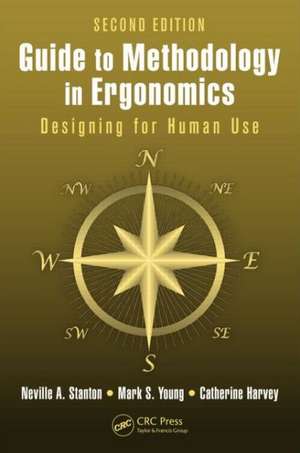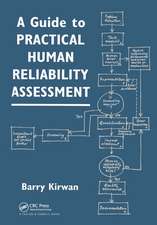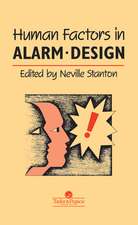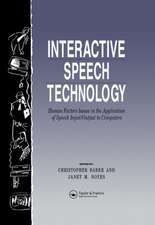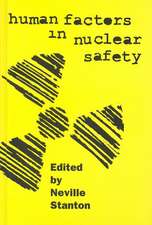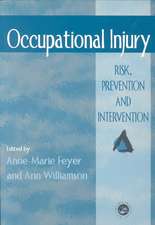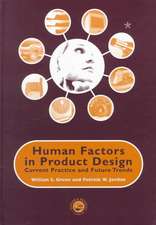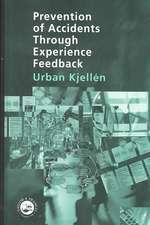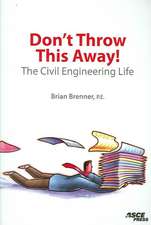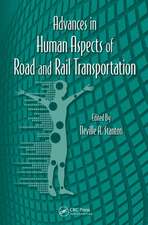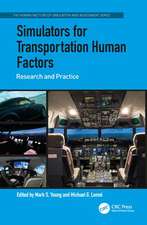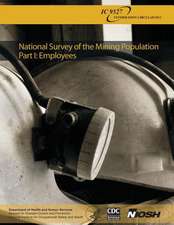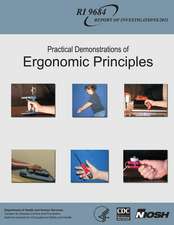Guide to Methodology in Ergonomics: Designing for Human Use, Second Edition
Autor Neville a. Stanton, Mark S. Young, Catherine Harveyen Limba Engleză Paperback – 23 iun 2014
See What’s in the New Edition:
- Four case studies
- Addition of another co-author
- Examples that reflect current technology
- Information on Critical Path Analysis (CPA)
The authors highlight where ergonomics methods fit in the design process and how to select a method appropriate for your purpose. They describe each method, supplying an overview, instructions on how to carry out an analysis, a mini bibliography, pros and cons, one or more examples, and a flow chart. They then rate each method for reliability/validity, resources, usability, and efficacy. The book then examines data from studies on training, reliability, and validity, and presents an equation that enables you to calculate approximately the financial benefits of using each method.
Based on research and expertise, the book gives you the freedom to be adventurous when choosing methods and the foundation to choose the method that fits the task at hand. Written by experts, it also helps you hone your skills and put the craft of ergonomics into practice.
| Toate formatele și edițiile | Preț | Express |
|---|---|---|
| Paperback (1) | 348.32 lei 6-8 săpt. | |
| CRC Press – 23 iun 2014 | 348.32 lei 6-8 săpt. | |
| Hardback (1) | 1040.52 lei 6-8 săpt. | |
| CRC Press – 20 sep 2017 | 1040.52 lei 6-8 săpt. |
Preț: 348.32 lei
Preț vechi: 467.05 lei
-25% Nou
Puncte Express: 522
Preț estimativ în valută:
66.66€ • 72.38$ • 55.99£
66.66€ • 72.38$ • 55.99£
Carte tipărită la comandă
Livrare economică 23 aprilie-07 mai
Preluare comenzi: 021 569.72.76
Specificații
ISBN-13: 9781466591851
ISBN-10: 1466591854
Pagini: 140
Ilustrații: 170 b/w images
Dimensiuni: 156 x 234 x 13 mm
Greutate: 0.2 kg
Ediția:Revizuită
Editura: CRC Press
Colecția CRC Press
ISBN-10: 1466591854
Pagini: 140
Ilustrații: 170 b/w images
Dimensiuni: 156 x 234 x 13 mm
Greutate: 0.2 kg
Ediția:Revizuită
Editura: CRC Press
Colecția CRC Press
Public țintă
Academic and Professional Practice & DevelopmentCuprins
Introduction. Case Studies: Keystroke Level Model. Link Analysis. Layout Analysis. Predictive Human Error Analysis. Observation. Questionnaires. Hierarchical Task Analysis. Repertory Grids. Task analysis for Error Identification. Layout analysis. Interviews. Heuristics. Utility Analysis. Training, Reliability and Validity. Bibliography. Author Index. Subject Index.
Recenzii
"This book provides an updated guide to several ergonomics methods for analyzing tasks and cognitive performance at work. The methods are described in readily understandable language and illustrated with practical examples. This book will be a valuable addition to the arsenal of the ergonomics practitioner."
—Alan Hedge is a Professor in the Department of Design and Environmental Analysis, Cornell University and a Research Professor in the Department of Mechanical and Aerospace Engineering at Syracuse University
"Stanton, Young, and Harvey have performed a signal service to the profession of ergonomics by bringing together in one place a lexicon of methods which permit the practitioner to enact their craft. Carefully selected from an even wider landscape of investigative techniques, these individual methods are highlighted, explicated, and integrated for those who look to operate in the real-world. The text then is a vital resource to all those who look to affect design, production, maintenance, and sustainability in ever more complex and resilient operational systems. Evolving from and updated with respect to an already classic resource, the present text provides convenient and relevant solutions to problems posed in all realms of human-technology interaction. Destined to take its place alongside other multi-edition classics, the present work is not merely about ergonomic tools but is a vital ergonomics tool in and of itself. This book should be in the locker of all those who practice ergonomics. Their investment in it will be repaid manifold, a modern and evolving classic of our times and of our profession."
—Peter Hancock, University of Central Florida
"Ergonomists need not only to understand various methods for evaluating and improving the design of artificial products, environments, and systems, but also to have the ability to choose the best method according to the purpose and situation. This book reviews 12 practical ergonomic methods for evaluating and improving the design of devices and interfaces. The main point of the book is to interpret the advantages and disadvantages of each method in detail from the ergonomic and financial perspectives. Interestingly, this book rates each method according to four perspectives: reliability/validity, resources, usability, and efficacy. [This helps] readers to choose the best method for the design on which they are working."
—Satoshi Muraki, Faculty of Design, Kyushu University, Japan
—Alan Hedge is a Professor in the Department of Design and Environmental Analysis, Cornell University and a Research Professor in the Department of Mechanical and Aerospace Engineering at Syracuse University
"Stanton, Young, and Harvey have performed a signal service to the profession of ergonomics by bringing together in one place a lexicon of methods which permit the practitioner to enact their craft. Carefully selected from an even wider landscape of investigative techniques, these individual methods are highlighted, explicated, and integrated for those who look to operate in the real-world. The text then is a vital resource to all those who look to affect design, production, maintenance, and sustainability in ever more complex and resilient operational systems. Evolving from and updated with respect to an already classic resource, the present text provides convenient and relevant solutions to problems posed in all realms of human-technology interaction. Destined to take its place alongside other multi-edition classics, the present work is not merely about ergonomic tools but is a vital ergonomics tool in and of itself. This book should be in the locker of all those who practice ergonomics. Their investment in it will be repaid manifold, a modern and evolving classic of our times and of our profession."
—Peter Hancock, University of Central Florida
"Ergonomists need not only to understand various methods for evaluating and improving the design of artificial products, environments, and systems, but also to have the ability to choose the best method according to the purpose and situation. This book reviews 12 practical ergonomic methods for evaluating and improving the design of devices and interfaces. The main point of the book is to interpret the advantages and disadvantages of each method in detail from the ergonomic and financial perspectives. Interestingly, this book rates each method according to four perspectives: reliability/validity, resources, usability, and efficacy. [This helps] readers to choose the best method for the design on which they are working."
—Satoshi Muraki, Faculty of Design, Kyushu University, Japan
Notă biografică
Neville A. Stanton, Mark S. Young, Catherine Harvey
Descriere
The second edition of a bestseller, this book examines a select but widely utilized group of psychological ergonomics methods. Completely revised and updated, it provides practitioners with valuable insight into how, where, and why each of the methodologies cited in the book has its unique utility and advantage. The step-by-step process provided with each methodology makes the book a requirement for every ergonomics practitioner's bookshelf.
